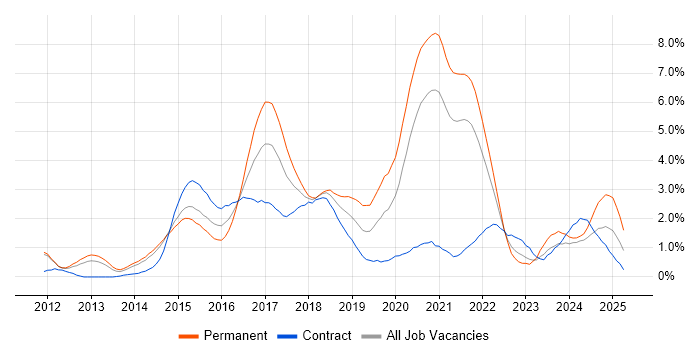NoSQL
South Yorkshire > Sheffield
The table below provides summary statistics for permanent job vacancies advertised in Sheffield requiring NoSQL skills. It includes a benchmarking guide to the annual salaries offered in vacancies that cited NoSQL over the 6 months leading up to 18 May 2025, comparing them to the same period in the previous two years.
| 6 months to 18 May 2025 |
Same period 2024 | Same period 2023 | |
|---|---|---|---|
| Rank | 37 | 81 | 100 |
| Rank change year-on-year | +44 | +19 | -59 |
| Permanent jobs citing NoSQL | 6 | 6 | 2 |
| As % of all permanent jobs advertised in Sheffield | 2.06% | 0.55% | 0.22% |
| As % of the Database & Business Intelligence category | 9.68% | 3.14% | 1.07% |
| Number of salaries quoted | 3 | 6 | 2 |
| 10th Percentile | £56,947 | £54,655 | £50,500 |
| 25th Percentile | £57,155 | £56,809 | £51,250 |
| Median annual salary (50th Percentile) | £61,206 | £61,206 | £52,500 |
| Median % change year-on-year | - | +16.58% | - |
| 75th Percentile | £67,802 | £65,603 | £53,750 |
| 90th Percentile | £69,121 | - | £54,500 |
| South Yorkshire median annual salary | £61,206 | £61,206 | £55,000 |
| % change year-on-year | - | +11.28% | +4.76% |
All Database and Business Intelligence Skills
Sheffield
NoSQL falls under the Databases and Business Intelligence category. For comparison with the information above, the following table provides summary statistics for all permanent job vacancies requiring database or business intelligence skills in Sheffield.
| Permanent vacancies with a requirement for database or business intelligence skills | 62 | 191 | 187 |
| As % of all permanent jobs advertised in Sheffield | 21.31% | 17.36% | 20.92% |
| Number of salaries quoted | 50 | 154 | 90 |
| 10th Percentile | £26,250 | £31,163 | £27,600 |
| 25th Percentile | £35,000 | £35,000 | £32,200 |
| Median annual salary (50th Percentile) | £60,000 | £47,500 | £48,877 |
| Median % change year-on-year | +26.32% | -2.82% | +8.62% |
| 75th Percentile | £69,375 | £62,188 | £70,000 |
| 90th Percentile | £75,000 | £70,500 | - |
| South Yorkshire median annual salary | £60,000 | £47,500 | £48,877 |
| % change year-on-year | +26.32% | -2.82% | +8.62% |
NoSQL
Job Vacancy Trend in Sheffield
Job postings citing NoSQL as a proportion of all IT jobs advertised in Sheffield.

NoSQL
Salary Trend in Sheffield
3-month moving average salary quoted in jobs citing NoSQL in Sheffield.
NoSQL
Co-occurring Skills and Capabilities in Sheffield by Category
The follow tables expand on the table above by listing co-occurrences grouped by category. The same employment type, locality and period is covered with up to 20 co-occurrences shown in each of the following categories:
|
|
||||||||||||||||||||||||||||||||||||||||||||||||||||||||||||||||||||||||||||||
|
|
||||||||||||||||||||||||||||||||||||||||||||||||||||||||||||||||||||||||||||||
|
|
||||||||||||||||||||||||||||||||||||||||||||||||||||||||||||||||||||||||||||||
|
|
||||||||||||||||||||||||||||||||||||||||||||||||||||||||||||||||||||||||||||||
|
|
||||||||||||||||||||||||||||||||||||||||||||||||||||||||||||||||||||||||||||||
|
|
||||||||||||||||||||||||||||||||||||||||||||||||||||||||||||||||||||||||||||||
|
|
||||||||||||||||||||||||||||||||||||||||||||||||||||||||||||||||||||||||||||||
|
|
||||||||||||||||||||||||||||||||||||||||||||||||||||||||||||||||||||||||||||||
